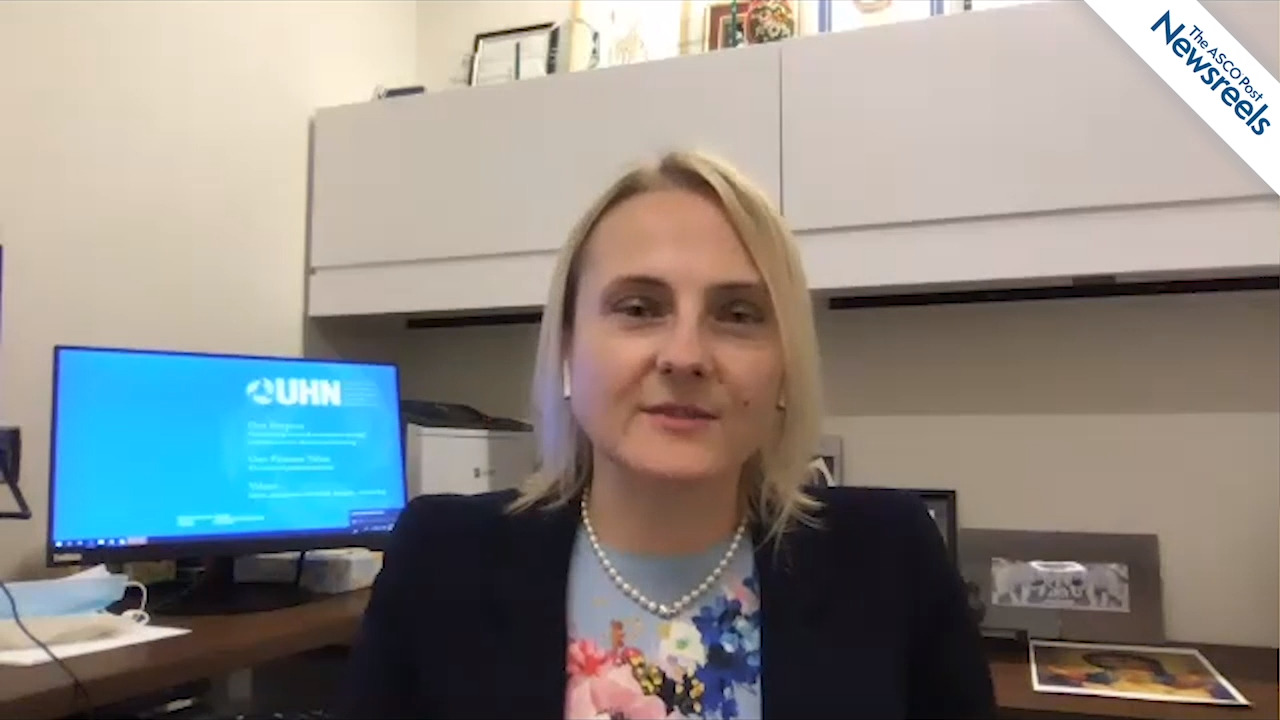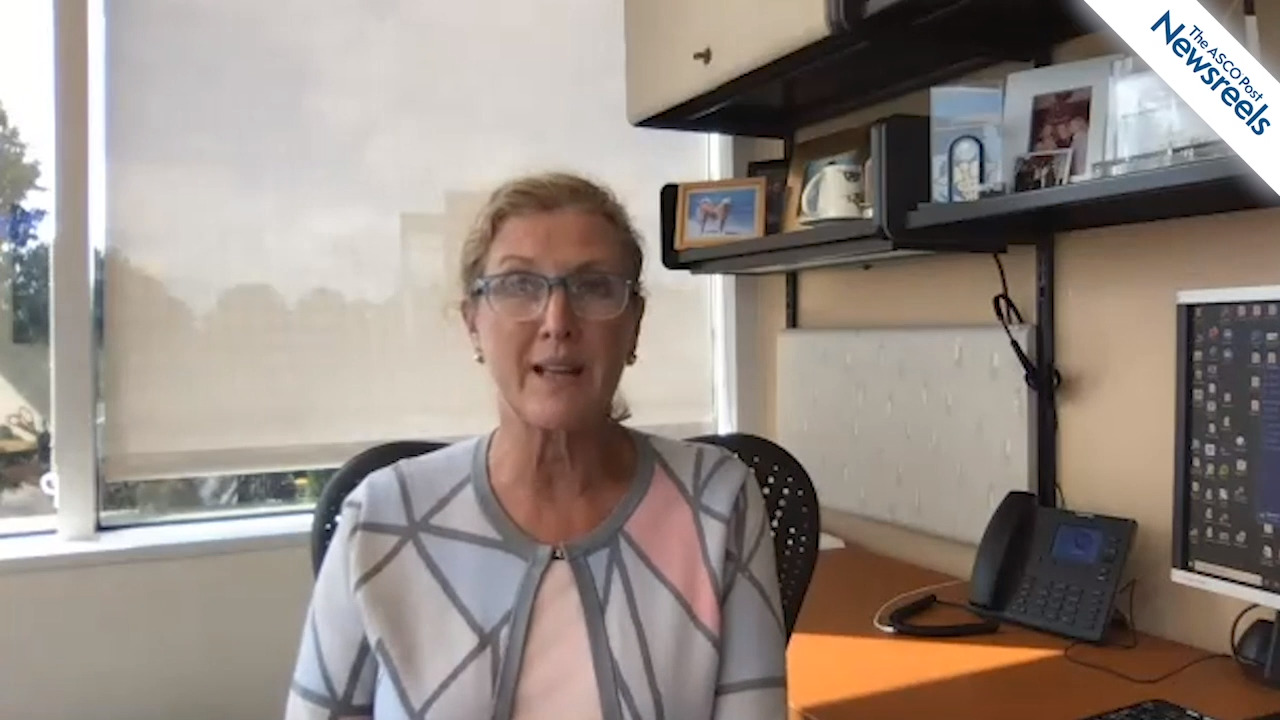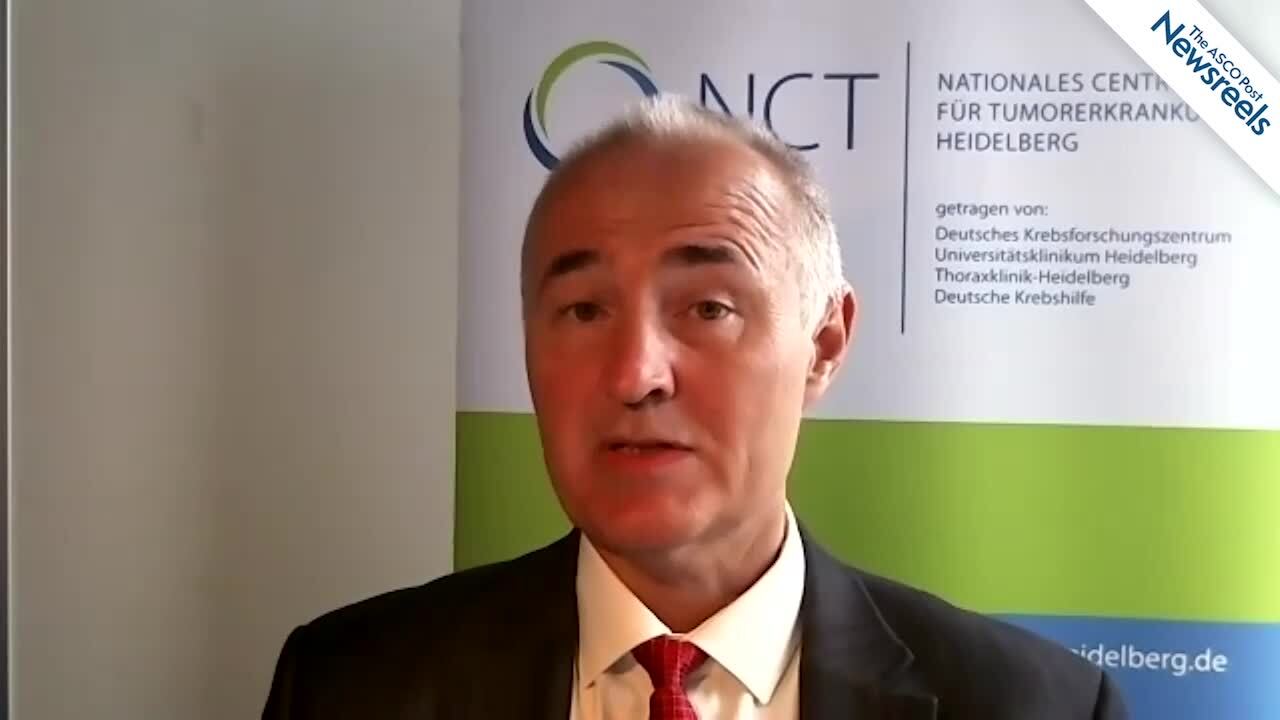Managing Breast Cancer in a Pregnant Patient
“One of the most challenging oncologic situations is the diagnosis of breast cancer in a young pregnant patient,” Jacqueline Jeruss, MD, PhD, Associate Dean, Regulatory Affairs; Director of the Breast Care Center; and Professor of Surgery, Pathology, and Biomedical Engineering at the University of...
High-Risk, HER2-Positive Breast Cancer: Neoadjuvant and Adjuvant Treatment Options
Although most patients with breast cancer are considered to have an overall excellent prognosis, 600,000 people still die annually of the disease around the world. Even in HER2-positive breast cancer, a subtype that has seen a transformation of outcomes in the past 2 decades, there’s still room for ...
HER2-Positive Metastatic Breast Cancer Highlights 2019–2020 Almanac
The past 2 years have seen a dramatic change in the standard of care for patients with HER2-positive metastatic breast cancer whose disease has progressed on trastuzumab. Promising new agents and combinations for later lines of therapy may also challenge current treatment strategies, according to...
Retrospective Analysis From the BIG 2-98 Trial of Adjuvant Docetaxel-Based Chemotherapy for Early Breast Cancer
A retrospective analysis from the BIG 2-98 trial reported in the Journal of Clinical Oncology by Christine Desmedt, PhD, of the Laboratory for Translational Breast Cancer Research, Department of Oncology, KU Leuven, Belgium, and colleagues showed poorer disease-free and overall survival with...
Long-Term Evaluation of Treatment Efficacy After Primary DCIS Diagnosis
A long-term study of women with ductal carcinoma in situ (DCIS) has shown that surgery to remove the tissue followed by radiotherapy may lower the risk of subsequent cancer compared to surgery alone. The study, presented at the 12th European Breast Cancer Conference by van Seijen et al (Abstract...
Breast Cancer Risk After Benign Breast Disease
Benign breast disease is known to increase the chances of subsequent breast cancer. According to Spanish researchers, the way benign breast disease is detected may be an indication of how likely it is to become cancerous. The findings from the team led by Xavier Castells, MD, PhD, Head of the...
Novel Indications and New Drugs for the Treatment of Patients With Breast Cancer
Over the past year (December 2019–September 2020), the U.S. Food and Drug Administration (FDA) granted approval to several novel drugs and new indications for therapeutic agents used in breast cancer. Pertuzumab/Trastuzumab/Hyaluronidase-zzxf On June 29, 2020, the FDA approved a new fixed-dose...
Emerging Alternatives in the Third-Line Setting for Metastatic HER2-Positive Breast Cancer
In the post-trastuzumab era, a number of U.S. Food and Drug Administration (FDA)-approved targeted agents for metastatic HER2-positive breast cancer are available, but there is no preferred option for third-line treatment and beyond. At the 2019 Chemotherapy Foundation Symposium, Shanu Modi, MD,...
Tucatinib Combination in Previously Treated HER2-Positive Metastatic Breast Cancer With Brain Metastases
In an analysis of the pivotal phase III HER2CLIMB trial reported at the ASCO20 Virtual Scientific Program, Nancy U. Lin, MD, of Dana-Farber Cancer Institute, Boston, and colleagues found that tucatinib, a small-molecule tyrosine kinase inhibitor that is highly selective for HER2, plus...
Local Recurrence With Radiation Boost in HER2-Positive Breast Cancer: HERA Trial Analysis
In a retrospective analysis reported in the International Journal of Radiation Oncology • Biology • Physics, Joseph Abi Jaoude, MD, of the American University of Beirut Medical Center, and colleagues found that a radiation boost did not reduce the risk of local recurrence among women with...
Advanced HER2-Positive Breast Cancer: All Eyes on These Novel Agents
New agents for the treatment of advanced HER2-positive breast cancer should be coming soon to your clinic, according to Sara A. Hurvitz, MD, Director of the Breast Cancer Clinical Research Program and Associate Professor of Medicine at the David Geffen School of Medicine at the University of...
Updates From Additional Clinical Trials in HER2-Positive Breast Cancer
Here we present summaries of several additional clinical trials in HER2-positive breast cancer reported over the past year. Jame Abraham, MD, Chair of the Division of Hematology and Oncology at the Taussig Cancer Center, Cleveland Clinic, shared his perspective on several of these trials presented ...
Phase III SOPHIA Trial Evaluates Margetuximab/Chemotherapy vs Trastuzumab/Chemotherapy for HER2-Positive Breast Cancer
The second interim analysis of the phase III SOPHIA trial demonstrated a significant, though modest, improvement in progression-free survival, response rate, and clinical benefit with the addition of margetuximab to chemotherapy vs trastuzumab plus chemotherapy in patients with HER2-positive...
Abemaciclib/Fulvestrant/Trastuzumab for Patients With Previously Treated HR-Positive, HER2-Positive Advanced Breast Cancer
In the phase II monarcHER trial reported in The Lancet Oncology, Sara M. Tolaney, MD, of Dana-Farber Cancer Institute, Boston, and colleagues, found that the combination of abemaciclib, fulvestrant, and trastuzumab prolonged progression-free survival vs trastuzumab plus standard-of-care...
Neratinib in Previously TreatedHER2-Positive Metastatic Breast Cancer: Point of View From the NALA Trial
Neratinib is an oral pan-HER tyrosine kinase inhibitor that is approved by the U.S. Food and Drug Administration (FDA) for two indications. The first is as adjuvant treatment of early-stage HER2-positive breast cancer following adjuvant trastuzumab therapy. The second is in combination with...
Patient Experiences of Acute Toxicity From Breast Radiotherapy According to Fractionation Scheme
In a study reported in the Journal of Clinical Oncology, Reshma Jagsi, MD, DPhil, and colleagues found differences in patient reports of acute toxicities according to fractionation scheme of whole-breast radiotherapy for breast cancer, with pain being reported more frequently in Black vs White...
Expert Point of View: Lisa A. Carey, MD
Invited study discussant Lisa A. Carey, MD, the Richardson and Marilyn Jacobs Preyer Distinguished Professor in Breast Cancer Research and Deputy Director of Clinical Sciences at the University of North Carolina-Chapel Hill, framed her remarks as a tale of two trials. Dr. Carey asked these...
IMpassion131: No Benefit for Atezolizumab Plus Paclitaxel in Triple-Negative Breast Cancer
Based on some unexpected negative results, oncologists using atezolizumab for metastatic triple-negative breast cancer should pair it with nab-paclitaxel, not paclitaxel. In contrast to the overall survival benefit shown for atezolizumab plus nab-paclitaxel in the previous IMpassion130...
FDA Pipeline: Priority Review for Agents in Multiple Myeloma, Anaplastic Large Cell Lymphoma
Recently, the U.S. Food and Drug Administration (FDA) granted Priority Review to therapies for pretreated patients with multiple myeloma and pediatric patients with ALK-positive anaplastic large cell lymphoma; granted Fast Track designation to novel agents in gastric/gastroesophageal junction...
Adjuvant Trastuzumab With or Without Chemotherapy for Older Patients With HER2-Positive Early Breast Cancer
In the Japanese RESPECT trial reported in the Journal of Clinical Oncology, Sawaki et al found that noninferiority of adjuvant trastuzumab alone vs with chemotherapy was not shown for disease-free survival among women with HER2-positive breast cancer between the ages of 70 and 80 years. However, a...
Addition of Atezolizumab to Neoadjuvant Chemotherapy in Early-Stage Triple-Negative Breast Cancer: IMpassion031 Trial
As reported in The Lancet by Elizabeth A. Mittendorf, MD, and colleagues, results from the phase III IMpassion031 trial showed improved pathologic complete response rates with the addition of atezolizumab to sequential nab-paclitaxel and anthracycline-based neoadjuvant chemotherapy in patients with ...
Adjuvant Abemaciclib Plus Endocrine Therapy in Patients With Early Breast Cancer at High Risk of Recurrence: monarchE Trial
As reported in the Journal of Clinical Oncology by Stephen R.D. Johnston, MD, PhD, and colleagues, the phase III monarchE trial has shown that adjuvant abemaciclib plus endocrine therapy significantly improved invasive disease–free survival vs endocrine therapy alone in patients with hormone...
Monika K. Krzyzanowska, MD, MPH, on Early-Stage Breast Cancer: Ambulatory Toxicity Management in the AToM Study
Monika K. Krzyzanowska, MD, MPH, of the Princess Margaret University Health Network, discusses study findings on remote proactive telephone-based toxicity management for patients with breast cancer receiving chemotherapy. Although the telehealth program was associated with fewer grade 3 toxicities and a slight decline in quality of life, it did not lead to fewer emergency department visits and hospitalizations (Abstract LBA87).
Lisa A. Carey, MD, on Triple-Negative Breast Cancer: Paclitaxel, Nab-paclitaxel, and Atezolizumab in IMpassion Trials
Lisa A. Carey, MD, of the University of North Carolina, discusses phase III results from two IMpassion trials, 130 and 131, which explored, respectively, atezolizumab plus nab-paclitaxel vs placebo plus nab-paclitaxel in previously untreated locally advanced or metastatic triple-negative breast cancer and first-line paclitaxel with or without atezolizumab for unresectable disease (Abstracts LBA15 and LBA16).
Aditya Bardia, MD, MPH, on Triple-Negative Breast Cancer: Sacituzumab Govitecan vs Treatment of Physician’s Choice
Aditya Bardia, MD, MPH, of Massachusetts General Hospital Cancer Center, discusses results from the phase III ASCENT trial, which showed the antibody-drug conjugate sacituzumab govitecan-hziy improved progression-free and overall survival more than standard single-agent chemotherapy in patients with previously treated metastatic triple-negative breast cancer (Abstract LBA17).
Breast Induration With Hypofractionated vs Standard Fractionated Radiotherapy in Patients With Early Breast Cancer or Ductal Carcinoma in Situ
In a Danish Breast Cancer Group phase III trial (DBCG HYPO) reported in the Journal of Clinical Oncology, Offersen et al found no difference in the rates of breast induration with moderately hypofractionated vs standard fractionated radiotherapy in women with early breast cancer or ductal carcinoma ...
Effect of Mammography Screening From Age 40 on Breast Cancer Mortality in the UK Age Trial
As reported in The Lancet Oncology by Stephen W. Duffy, MSc, of the Centre for Cancer Prevention, Wolfson Institute of Preventive Medicine, Queen Mary University of London, and colleagues, final results of the UK Age Trial show that initiation of annual mammography screening for breast cancer at...
New Breast Cancer Agents and Concurrent Radiation: Risk or Benefit?
Most of the newer systemic treatments for breast cancer can be safely and effectively paired with radiation therapy—although there are some exceptions, according to Mylin A. Torres, MD, the Louisa and Rand Glenn Family Chair in Breast Cancer Research and Associate Professor of Radiation Oncology at ...
Neratinib in Previously Treated HER2-Positive Metastatic Breast Cancer: Point of View From the NALA Trial
Neratinib is an oral pan-HER tyrosine kinase inhibitor that is approved by the U.S. Food and Drug Administration (FDA) for two indications. The first is as adjuvant treatment of early-stage HER2-positive breast cancer following adjuvant trastuzumab therapy. The second is in combination with...
Phase III NALA Trial Meets Primary Endpoint in Previously Treated HER2-Positive Breast Cancer
As reported in the Journal of Clinical Oncology by Cristina Saura, MD, of Vall d’Hebron University Hospital, Barcelona, and colleagues, the phase III NALA trial has shown significantly prolonged progression-free survival with the irreversible pan-HER tyrosine kinase inhibitor neratinib plus...
Age at Diagnosis May Improve Risk Stratification for Patients With Breast Cancer
Age is not just a number when it comes to prognosis for invasive breast cancer. According to data presented during the 2020 Society of Surgical Oncology (SSO) International Conference on Surgical Cancer Care, age at diagnosis of breast cancer is a highly prognostic clinical variable that warrants...
Erica L. Mayer, MD, MPH, on Early Breast Cancer: Palbociclib With Endocrine Therapy vs Endocrine Therapy Alone
Erica L. Mayer, MD, MPH, of Dana-Farber Cancer Institute, discusses an initial analysis of phase III findings from the PALLAS trial, which suggested the benefits observed in the metastatic setting with palbociclib plus endocrine therapy did not translate into the earlier adjuvant setting for patients with hormone receptor–positive, HER2-negative breast cancer. Long-term follow-up is ongoing (Abstract LBA12).
Use of ctDNA to Direct Therapy in Advanced Breast Cancer
In the phase IIa plasmaMATCH platform trial reported in The Lancet Oncology, Nicholas C. Turner, MD, and colleagues found that circulating tumor DNA (ctDNA) provided accurate genotyping that permitted selection of directed therapies in patients with advanced breast cancer. Study Details The...
Abbreviated Breast MRI as Supplementary Screening Method in Women With Dense Breasts
In a single-institution retrospective analysis reported in the Journal of Clinical Oncology, Weinstein et al identified the prevalent cancer detection rate associated with supplemental abbreviated breast magnetic resonance imaging (MRI) screening among average-risk women with dense breasts who had...
Impact of Neoadjuvant Endocrine Therapy and Neoadjuvant Chemotherapy on Rates of Breast‑Conserving Surgery
“Studies that have compared neoadjuvant endocrine therapy with neoadjuvant chemotherapy have shown low pathologic complete response rates with both approaches. However, the rates of breast-conserving surgery have been shown to be slightly higher with neoadjuvant endocrine therapy,” Kelly Hunt, MD,...
Stephen R.D. Johnston, MD, PhD, on Early Breast Cancer: Abemaciclib in High-Risk Disease
Stephen R.D. Johnston, MD, PhD, of The Royal Marsden NHS Foundation Trust, discusses phase III study findings from the global monarchE trial, which showed that when added to standard adjuvant endocrine therapy, abemaciclib is the first CDK4/6 inhibitor to improve invasive disease–free survival in hormone receptor–positive high-risk early breast cancer (Abstract LBA5_PR). Read more on the monarchE trial in the Journal of Clinical Oncology.
Erika P. Hamilton, MD, on Breast Cancer: Abemaciclib With or Without Tamoxifen in HR-Positive, HER2-Negative Metastatic Disease
Erika P. Hamilton, MD, of Sarah Cannon Research Institute, discusses results of the nextMONARCH study, which indicated that combining abemaciclib with tamoxifen improved overall survival. Dr. Hamilton also details adverse events in different arms of the study (Abstract 273O).
Andreas Schneeweiss, MD, on Breast Cancer: Comparing Neoadjuvant Chemotherapy With Paclitaxel, Doxorubicin, and Carboplatin
Andreas Schneeweiss, MD, of the Heidelberg University Hospital and German Cancer Research Center, discusses phase III survival data from the GeparOcto trial, which compared the neoadjuvant chemotherapy intense dose-dense EPC (epirubicin, paclitaxel, and cyclophosphamide) with weekly paclitaxel and liposomal doxorubicin (with or without carboplatin in triple-negative breast cancer) for patients with high-risk early breast cancer (Abstract 160O).
Abemaciclib Plus Endocrine Therapy May Reduce Recurrence in Early Breast Cancer: monarchE Trial
For the first time, an inhibitor of cyclin-dependent kinases 4 and 6 (CDK4/6) has improved outcomes in patients with early breast cancer when combined with standard endocrine therapy, Stephen Johnston, MD, PhD, and colleagues reported at the ESMO Virtual Congress 2020 (Abstract LBA5_PR)....
Addition of Pembrolizumab to Eribulin in HR-Positive, HER2-Negative Metastatic Breast Cancer
In a phase II trial reported in JAMA Oncology, Sara M. Tolaney, MD, MPH, and colleagues found that the addition of pembrolizumab to eribulin did not improve progression-free survival in women with hormone receptor (HR)-positive, HER2-negative metastatic breast cancer. As stated by the...
Meta-analysis of Duration of Adjuvant Trastuzumab in Early Breast Cancer
In individual participant data and trial-level meta-analyses reported in JAMA Network Open, Gulia et al found that disease-free survival with adjuvant trastuzumab given for less than 1 year was noninferior to 1 year of trastuzumab therapy in patients with early breast cancer. In addition, the...
High-Risk, HER2-Positive Breast Cancer: Neoadjuvant and Adjuvant Treatment Options
Although most patients with breast cancer are considered to have an overall excellent prognosis, 600,000 people still die annually of the disease around the world. Even in HER2-positive breast cancer, a subtype that has seen a transformation of outcomes in the past 2 decades, there’s still room for ...
Local Recurrence With Radiation Boost in HER2-Positive Breast Cancer: HERA Trial Analysis
In a retrospective analysis reported in the International Journal of Radiation Oncology • Biology • Physics, Jaoude et al found that a radiation boost did not reduce the risk of local recurrence among women with HER2-positive breast cancer receiving breast-conserving surgery, whole-breast...
FDA Issues Alert About Efficacy and Potential Safety Concerns Regarding Atezolizumab Plus Paclitaxel in Metastatic Triple-Negative Breast Cancer
On September 8, the U.S. Food and Drug Administration (FDA) alerted health-care professionals, oncology clinical investigators, and patients that a clinical trial studying the use of atezolizumab and paclitaxel in patients with previously untreated, inoperable, locally advanced or metastatic...
FDA Pipeline: Priority Reviews in Multiple Myeloma, Metastatic Breast Cancer, and NSCLC
Recently, the U.S. Food and Drug Administration (FDA) granted Priority Review to agents for the treatment of refractory multiple myeloma, metastatic breast cancer, and metastatic non–small cell lung cancer (NSCLC); gave Fast Track designation to treatments for NTRK mutation–positive solid tumors...
Strategies for Early Detection and Management of Lymphedema
The standard of care since 2003, sentinel lymph node biopsy has dramatically reduced the risk of lymphedema in early breast cancer, but more than 6% of patients still develop the condition. At the ASCO20 Virtual Education Program, Nicole L. Stout, DPT, CLT-LANA, FAPTA, Research Assistant Professor...
Long-Term Outcomes With Accelerated Partial-Breast vs Whole-Breast Irradiation in Patients With Early Breast Cancer
As reported in the Journal of Clinical Oncology by Icro Meattini, MD, and colleagues, 10-year follow-up of the Italian single-center APBI-IMRT-Florence trial showed no differences in ipsilateral recurrence or survival with accelerated partial-breast irradiation vs whole-breast irradiation after...
Updated Results of the ALTERNATIVE Trial of Lapatinib/Trastuzumab Plus AI in HER2-Positive, HR-Positive Metastatic Breast Cancer
Updated results of the phase III ALTERNATIVE trial of dual HER2 inhibition with lapatinib/trastuzumab plus aromatase inhibitor (AI) therapy in HER2-positive, hormone receptor (HR)-positive metastatic breast cancer were reported in the Journal of Clinical Oncology by Johnston et al. The previously...
Addition of Veliparib to Carboplatin/Paclitaxel in Previously Treated Patients With BRCA-Mutated Advanced Breast Cancer: BROCADE3 Trial
As reported in The Lancet Oncology by Véronique Diéras, MD, and colleagues, the phase III BROCADE3 trial showed a significant improvement in progression-free survival with the addition of the poly (ADP-ribose) polymerase (PARP) inhibitor veliparib to carboplatin and paclitaxel in patients with...
Association of Adjuvant Endocrine Therapy With Overall Survival in Small HR-Positive, HER2-Negative Breast Cancer
In a National Cancer Database cohort study reported in a research letter in JAMA Network Open, Ma et al found that receipt vs no receipt of adjuvant endocrine therapy was associated with improved overall survival in women with small hormone receptor (HR)-positive, HER2-negative breast cancers. As...







